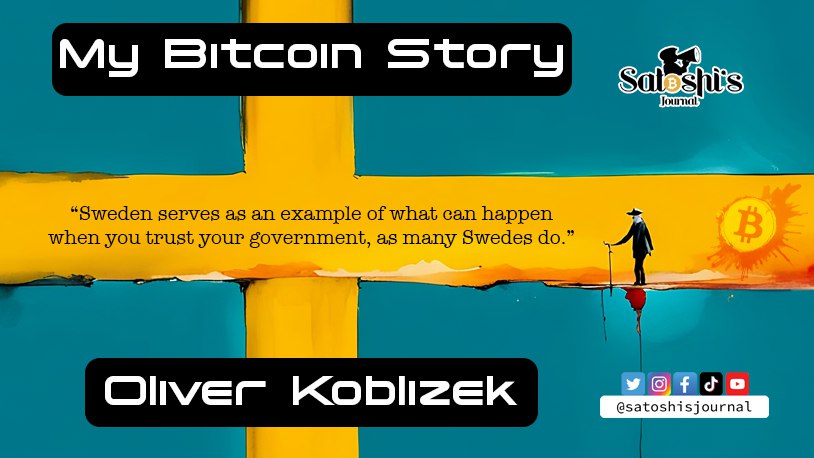
You might have heard that Bitcoin can help people in Africa or China, individuals living in countries where their human rights are not guaranteed. When someone like me, who lives in Sweden, talks to someone from the West about Bitcoin, I often get the same response: “But that wouldn’t happen here.” When I tell them that the government can and will abuse their power if we let them remove our paper money and move to an all-digital system, recent events in the West prove otherwise.
As seen with the trucker convoy in Canada, governments in the West are willing to use their power against their people when they deem it necessary. This year, a similar incident occurred to me in Sweden for a minor offense. But before I share how Bitcoin literally helped me to eat, let me tell you how I discovered Bitcoin.
My family on my mother’s side are descendants of Germans and Czechs who lived under brutal communist dictatorships. They had everything they owned stolen from them. My family used to be wealthy, with my grandmother living in luxury due to my great grandfather owning a large clothing manufacturing business in Germany (modern-day Poland). However, as World War II ended and Germany lost, everything was taken from us by Russian soldiers. In an instant, my family lost everything.
In 2013, my older brother found Bitcoin when the Silk Road was popular. As a libertarian, he was intrigued by the idea of a marketplace where anything could be bought. He invested $100 in Bitcoin, although he never used it on the Silk Road. The technology fascinated him. In 2016, my brother told me about Bitcoin and how it could have protected our grandmother from losing everything after the war, had she possessed it. At that time, I reviewed computer parts and had access to many GPUs. So that summer, I mined Bitcoin in the basement of my mother’s place to try it out and learn. After deducting expenses, I made 0.1 Bitcoin. It was a valuable learning experience. One of the last conversations I had with my brother in 2020, just weeks before he died from cancer, was about Bitcoin and we talked about the Lightning Network and its potential to realize the vision of Bitcoin.
That’s the story of why I am a Bitcoiner, When people hear about Sweden, they often think of a nice Nordic country where rights are respected, and everyone lives well. For the most part, this is true, but my government has made significant flaws when it comes to respecting the privacy of its citizens.
In 2011, BankID was introduced in Sweden, a digital ID used to sign government and other documents, access healthcare websites, and perform banking transactions. Initially, it seemed convenient, but it quickly spiraled out of control. Even something as simple as buying a bus ticket now requires BankID in certain places. In Stockholm, you can’t buy a metro ticket with cash; it’s either card or Swish, a payment system created by major banks. Swish is highly popular and has become a verb, similar to saying “Google it.” When I use Swish at a 7-Eleven to buy a coke, I have to identify myself via BankID. Can you imagine that? The government wants me to show identification for a soda, even though there’s no alcohol sold at 7-Eleven in Sweden (only at government stores). There is no need to ID me, especially not for a simple purchase. Moreover, if you value privacy, cash is not accepted by cashiers, making it very difficult to spend cash in my city. Even paying for parking requires BankID/Swish or card, further increasing surveillance on citizens. Recently, there has been a push for a new digital ID called Freja ID, which is an actual ID on your phone showing your picture and personal information. However, with this ID, the government can track your whereabouts. Although it is currently optional, it’s clear where this is heading. They want us to use these systems to track us better and cut us off when they believe we haven’t complied with their expectations.
This brings me to how Bitcoin saved me. A few weeks ago, I tried “Swiss Bitcoin Pay,” a merchant service that automatically sends incoming Bitcoin payments to your bank account. I sent myself $5 to test it out. My bank immediately froze my account and demanded an explanation for the origin of those $5. I provided the necessary details, stating that they came from a Bitcoin company. However, my bank informed me that Bitcoin payments were not allowed and froze my account for a week. During that week, I couldn’t eat. I couldn’t even withdraw cash from an ATM because my bank account was inaccessible, and even if it had been, most grocery stores in Sweden don’t accept cash. I was completely frozen out of the system, unable to buy a bus ticket or pay for parking. However, I could still eat thanks to Bitrefill. I used Bitcoin to purchase a gift card for my grocery store, which allowed me to feed myself for that week. All this happened because I received $5 from a Bitcoin company. If they are willing to starve me over $5, imagine the measures they would take against protesters, such as the truckers in Canada. I would assume the suppression would be even harsher than what occurred in Canada, as all the necessary systems are already in place.
Sweden was one of the first countries to experiment with central bank digital currency (CBDC) and has now introduced significant taxes for Bitcoin miners, forcing them to leave despite their flourishing industry in Northern Sweden. Additionally, Sweden has been working in Brussels, the capital of the European Union, to introduce laws banning proof-of-work and mandating KYC for all Bitcoin transactions. It’s evident that Bitcoin is not only necessary for people in the global South but also for individuals like me in the West who have been frozen out of the system, all for the sake of $5.
If you take anything away from this, please make it known to your leaders not to follow in Sweden’s footsteps by introducing digital IDs and eliminating cash. These actions violate the human right to privacy, as outlined in Article 12 of the UN Universal Declaration of Human Rights. Sweden serves as an example of what can happen when you trust your government, as many Swedes do. While this system mostly works, as demonstrated, it can be used by the government to silence those they dislike or accidentally exclude individuals from society.
Stack sats. Run a node.
– Oliver Koblizek
This is a guest post by Oliver Koblizek . Opinions expressed are entirely their own and do not necessarily reflect those of Satoshi’s Journal.
How Would You Rate This Article?

